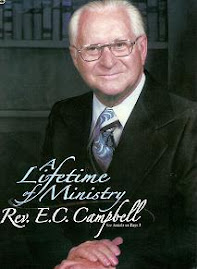When the local churches of the New Testament worshiped, they would sing praises to encourage one another and to jointly express their gratitude unto God. They would also pray together voicing unto God their joint concerns. They would involve themselves together in a study of the word, with a teacher or preacher expounding on the doctrine of Christ. Also, on the first day of the week, or Sunday, they would take up a collection by which the members of the local church could pool their resources into a common treasury for the purpose of carrying out works which God appointed the local church to do. Also, on this day, Christians would remember the Lord's death for them by observing the Lord's supper as He had directed (ACTS 2:42; ACTS 20:7; I CORINTHIANS 16:1,2).
Tuesday, September 24, 2013
THE WORSHIP OF THE LOCAL CHURCH
"...and let us consider how to stimulate one another to love and good deeds, not forsaking our own assembling together, as is the habit of some, but encouraging one another; and all the more, as we see the day drawing near.." (HEBREWS 10:24,25). The purpose of worship is at least two-fold. Jehovah is glorified by the acts of the faithful worshiper. The other purpose of worship is for the benefit of the worshiper. Both of these purposes are mentioned in the instructions the New Testament gives concerning worshipping God in song; "Let the word of Christ richly dwell within you, with all wisdom teaching and admonishing one another with psalms, hymns and spiritual songs, singing with thankfulness in your hearts unto God." (COLOSSIANS 3:16).
THE WORK OF THE LOCAL CHURCH
"...I write so that you may know how one ought to conduct himself in the household of God, which is the church of the living God, the pillar and the support of the truth." (I TIMOTHY 3:15). The purpose of the church is to bring God glory by declaring His wisdom to the universe (EPHESIANS 3:10,11). This is in accordance with God's eternal purpose! God's plan for the church has been around for a long time; in fact, His plan predates the creation of the earth; it is eternal.
God has made the church responsible for holding forth the truth of the gospel to the world. The church at Thessalonica was commended for the diligent way in which they undertook this mission; "...so that you became an example to all the believers in Macedonia and Achaia. For the word of the Lord has sounded forth from you, not only in Macedonia and Achaia, but also in every place your faith toward God has gone forth, so that we have no need to say anything." (I THESSALONIANS 1:7,8).
Some in the local church at Corinth were having a difficult time cooperating with one another. They were still too carnal; envious and jealous of one another. Paul told them that their relationship to Jesus and to one another, and the heavy responsibility of the work God had given them to do, made it important for them to put away such worldly attitudes. He described the local church as a body which needs the efforts of every one of its members: "...Now you are Christ's body, and individually members of it." (I CORINTHIANS 12:14-27).
The local church today needs each of its members to join in the godly efforts of the congregation. "The body is not one member, but many." If each member does not do His part, then the most important work we could possibly be involved with suffers. The church is the body of Christ; and He is the head of the body. We must listen to the head. Because of the human part, no local church is perfect. But because of Christ, let each member push on toward perfection, always growing, and never quitting.
Thursday, September 19, 2013
"We Know"
Have you ever taken a walk through an old cemetery? If you do, take time to read the headstones and observe family history within a row of markers. In some places, without any prior knowledge of people personally, you can, in a matter of minutes, find yourself caught up in the sufferings and hardships others have gone through. You realize that in past generations people seemed to be more conscious of the realities of life and death – suffering, loss, loneliness and the haunting realization that life is uncertain … death is sure … and eternity is where we are all headed! It is here, among these reminders of truth and reality that, if we are quiet, we hear in our spirit that inner voice that calls us to be ready, to be sure we are prepared for the inevitable … an unavoidable encounter with the Living God. It is toward this appointment that the apostle John devotes much attention in his first epistle.
The beloved disciple John is a very intentional writer, and he desires his readers to clearly know his purpose for each letter. In each of his books we find somewhere in his personal remarks his reason for writing. Whether it was to praise a faithful brother, or to expose a professing believer who had misrepresented the gospel, or to assure his “children” of his love for them and his joy in hearing that they walk in truth.
In John’s gospel account, his purpose is for us to know (to comprehend and understand by faith) the deity of Jesus Christ, and find that through believing in Him (firmly clinging to, relying upon and totally trusting His faithful sacrifice on the cross) we may inherit eternal life (20:31). When he writes the epistle of I John, he addresses in several passages his intended purpose for these writings, and then sums them all up in 5:13 saying, “these things I have written to you who believe in the name of the Son of God, that you may KNOW that you have eternal life.” In other words, the gospel of John was written so men could be saved and the epistle was written so that we could know we have been saved!
John’s literary technique is to use contrasts. Throughout the letter he is comparing — light to darkness, truth to error, life to death and you see the earmarks of what it means to be born of God. These patterns along with the phrase “we know” give us the foundation for the doctrine of assurance.
Article Source/AAA RevivalMinistries
The beloved disciple John is a very intentional writer, and he desires his readers to clearly know his purpose for each letter. In each of his books we find somewhere in his personal remarks his reason for writing. Whether it was to praise a faithful brother, or to expose a professing believer who had misrepresented the gospel, or to assure his “children” of his love for them and his joy in hearing that they walk in truth.
In John’s gospel account, his purpose is for us to know (to comprehend and understand by faith) the deity of Jesus Christ, and find that through believing in Him (firmly clinging to, relying upon and totally trusting His faithful sacrifice on the cross) we may inherit eternal life (20:31). When he writes the epistle of I John, he addresses in several passages his intended purpose for these writings, and then sums them all up in 5:13 saying, “these things I have written to you who believe in the name of the Son of God, that you may KNOW that you have eternal life.” In other words, the gospel of John was written so men could be saved and the epistle was written so that we could know we have been saved!
John’s literary technique is to use contrasts. Throughout the letter he is comparing — light to darkness, truth to error, life to death and you see the earmarks of what it means to be born of God. These patterns along with the phrase “we know” give us the foundation for the doctrine of assurance.
Article Source/AAA RevivalMinistries
Wednesday, September 18, 2013
Our Goodness?
There is a problem running rampant within Christianity today. It is one of those problems that we seldom recognize, and fail to face up to if we do. It is a problem that doesn’t seem to be a problem. This problem is our own goodness, and the way it prevents us from experiencing the gospel.
Instead, being Christian is about being made good by Someone else. That’s what the gospel is all about. It’s the good news that we don’t have to try harder to do good things. Instead, because of Jesus’ sinless life, death, and resurrection, we can be forgiven of our sins and totally transformed to actually be good. That’s a lot better than just doing good. What this means is that we can not only do good, but we can actually be good at our very core.
This is good news. It’s a relief for many of us who strive and anguish and labor, and persecute ourselves over not following our list of rules. Being good on our own is tiring. It’s discouraging. And it’s meant to be. The law doesn’t save. It shows us that we need to be saved by the gospel.
Instead of trying to fix your brokenness, admit that only God can do that. Give up your grip on your own rules and lists. In full realization of your brokenness, turn to the Healer who will restore you. Celebrate his grace, and fall into his arms in a deep and abiding experience of true gospel living.
Article Source/Crossleasdership Blog.
The Gospel Isn’t About Doing Good. It’s about Being Made Good.
We so often confuse “doing good” with being a Christian. They’re not the same thing. People who do not believe in Jesus can do good. Of course, Christians should do good, but good behavior is not Christianity. We deceive ourselves if we think that doing good is the same as being Christian.Instead, being Christian is about being made good by Someone else. That’s what the gospel is all about. It’s the good news that we don’t have to try harder to do good things. Instead, because of Jesus’ sinless life, death, and resurrection, we can be forgiven of our sins and totally transformed to actually be good. That’s a lot better than just doing good. What this means is that we can not only do good, but we can actually be good at our very core.
Your Goodness Isn’t Good Enough
When we think that our goodness is good enough, we’ve fallen short of the gospel. The gospel isn’t a list of behaviors to imitate. The gospel is the start, the substance, and the meaning of a totally new life. Here are a few examples of our sham goodness that creeps into our life, and begins to edge out the primacy of the gospel.- Voting Republican
- Voting Democrat
- Giving to poverty or AIDS relief
- Being against homosexuality
- Bumper stickers that profess hatred of sin, allegience to God, and what’s going to happen to the vehicle you’re raptured
- Not having an affair
- Not gambling
- Attending a Bible study
- Faithful attendance at church
Dangers of List-Keeping Christianity
There is a grave danger in keeping our little lists, doing our little goodnesses, and smiling about our pretend holiness.- It minimizes our sense of guilt before God. We are all guilty sinners before God. When we do good things, however, it tends to erase our sense of guilt. At that point, we find ourselves in the position of the hypocritical Pharisees, who kept the law to a T, but rejected God at the core.
- It causes us to be critical and judgmental of those who don’t keep our lists of good behaviors. If we encounter believers who don’t mind their Ps and Qs in the same way that we do, our attitude changes from loving acceptance and Christian charity, to one of lurking suspicion and judgmental exclusion. This is tragic. Whereas the gospel provides unity, keeping lists of rules provides dangerous divisiveness.
- It causes us to look at our performance than our raw and ugly brokenness. Keeping rules gives us the smug assurance that we’re doing alright. In reality, we are merely spraying perfume on the rotting carcass of our depravity. We need to acknowledge our depravity so we can then see the atomic power of the gospel and the brilliant holy glory of Jesus Christ.
This is good news. It’s a relief for many of us who strive and anguish and labor, and persecute ourselves over not following our list of rules. Being good on our own is tiring. It’s discouraging. And it’s meant to be. The law doesn’t save. It shows us that we need to be saved by the gospel.
Instead of trying to fix your brokenness, admit that only God can do that. Give up your grip on your own rules and lists. In full realization of your brokenness, turn to the Healer who will restore you. Celebrate his grace, and fall into his arms in a deep and abiding experience of true gospel living.
Article Source/Crossleasdership Blog.
Forgive
Bitterness rents a room in the soul to the one we hate. "To forgive is to set a prisoner free and discover that the prisoner was you."
Forgiving is not forgetting the crime, excusing it, or pretending that its pain is not horrific. Forgiving is pardoning—choosing not to punish. It is giving up your right to hurt the one who hurt you. It is something we do for the sake of the one who hurt us, and even more for ourselves.
Is there unpardoned pain in your heart this morning? You can ask God to forgive the one who hurt you, and ask him to help you do the same. And you will learn that "forgiveness is the giving, and so the receiving, of life."
Forgiving is not forgetting the crime, excusing it, or pretending that its pain is not horrific. Forgiving is pardoning—choosing not to punish. It is giving up your right to hurt the one who hurt you. It is something we do for the sake of the one who hurt us, and even more for ourselves.
Is there unpardoned pain in your heart this morning? You can ask God to forgive the one who hurt you, and ask him to help you do the same. And you will learn that "forgiveness is the giving, and so the receiving, of life."
Tuesday, September 17, 2013
Subscribe to:
Posts (Atom)


































































































